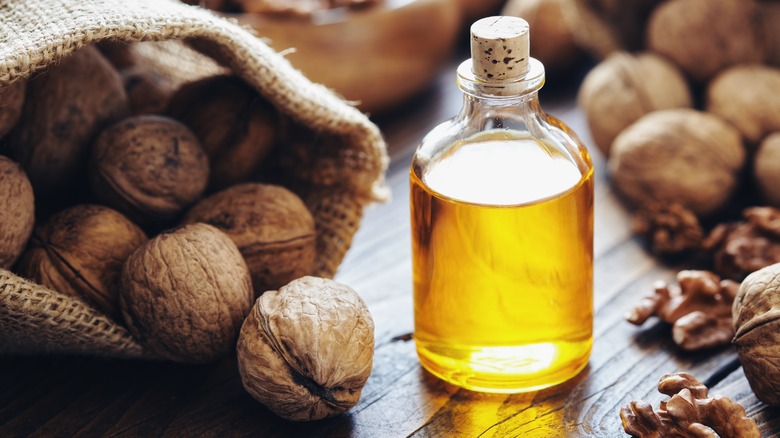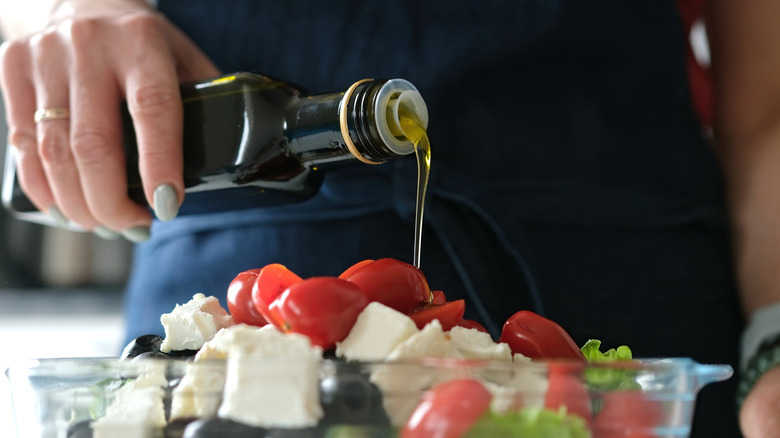What To Always Keep In Mind When Cooking With Unrefined Walnut Oil
There are several reasons why you might want to start cooking with unrefined walnut oil. It has omega-3 fatty acids that may improve skin health, and the oil is also linked to possible benefits like reductions in inflammation, blood pressure, and LDL cholesterol levels. Even with its nutritional profile aside, there's the simple fact that walnut oil can be utterly delicious when incorporated into dishes. However, the key is to use it properly.
Made from ground and pressed walnuts, this amber-colored oil has a buttery and nutty flavor with a hint of sweetness. It tastes much like the bitter and earthy nut from which it's made, but it's more gentle and mellow in comparison. However, the delicate flavor of unrefined walnut oil will quickly become too bitter and astringent if it's heated — a common mistake that can be made when cooking with oil.
This is why it's best to use unrefined walnut oil only in recipes that require little to no heat — just as you would other delicate nut and seed-based oils like those made from flaxseeds, pumpkin seeds, or pistachios. Unrefined walnut oil is excellent as a finishing oil where its nuanced flavor can truly shine. Drizzle it on top of veggies, breads, fish, and pastas once they are cooked, or add it to salad dressings for a boost of earthiness.
Unrefined oils aren't the best for high-heat cooking
This rule doesn't just apply to unrefined walnut oil. Most unrefined oils are sensitive to heat because of the way in which they are processed. Oils are extracted by roasting, crushing, and then pressing nuts, fruits, vegetables, and seeds. After this, they are either lightly filtered and bottled as is to make unrefined oils, or they are thoroughly strained using heat, chemicals, deodorants, and bleach to make refined versions.
There are pros and cons to both types. Unrefined oils are close to being as natural as possible, which means they have more flavor, fragrance, and color, and are packed with nutrients. However, these compounds are sensitive to heat. This is why unrefined oils have lower smoke points — AKA the temperature at which they begin to smoke up and burn. Unrefined walnut oil has a very low smoke point of 320 degrees Fahrenheit. For context, extra virgin olive oil can withstand heat up to 410 degrees Fahrenheit whereas safflower oil can go up to 510.
This renders unrefined walnut oil unsuitable for practically anything besides being used in dressings, light baking, or to finish a dish. Heat the oil any further and you not only destroy its nutrients and burn its delicate flavor, you also risk it developing harmful radicals. On the flip side, refining gets rid of those volatile compounds, meaning refined oils are more stable and have higher smoke points.
The do's and don'ts of using walnut oil
It's important to check what kind of walnut oil you have before cooking with it. Unrefined walnut oil has less bitterness and is generally more flavorful. However, there are also refined versions that are more muted in terms of taste, but which can withstand comparatively more heat and therefore can be used for sautéing. Some brands also made a blend of both versions so that the oil can be used both for low-heat cooking as well as for finishing.
Unrefined oils also perish quicker than refined versions, so that's another thing to bear in mind. Keep the oil in a cool place away from light, air, and heat. Although room temperature is fine, some cooking oils fare better in the fridge, as does unrefined oil if it's a month old or more. An unopened bottle of walnut oil will generally stay fresh for a year. Once opened though, it's best to use it up within six months to make the most of its nutty flavor. When in doubt of freshness, always go by the oil's expiration date. You could even do a smell test: If the walnut oil's nutty aroma has developed a rancid stench, it's time to toss it out.



